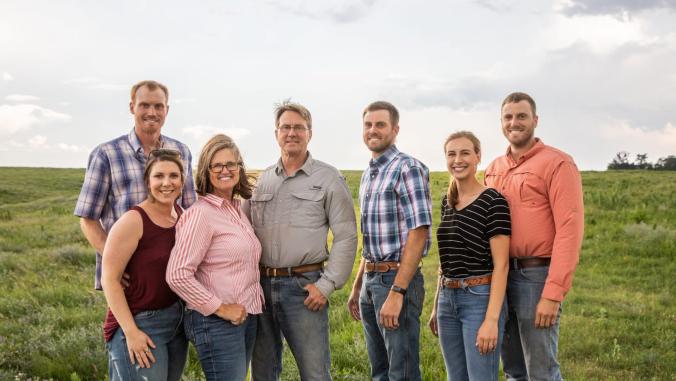Joel Makower in conversation with EPA Administrator Lisa Jackson
In the final weeks of her tenure, EPA's head talks about how business perceives her agency, her vision for sustainability, and where things might go from here.

Recently, during the waning weeks of President Obama’s first term, I sat with EPA Administrator Lisa Jackson to discuss her vision for embedding sustainability into the agency’s mission and programs. Following is that conversation, edited for clarity.
Joel Makower: How did this vision to embed sustainability into the EPA’s mission come to be?
Lisa Jackson: One of the things I wanted to do before I left is to take the Green Book report that the National Academy of Sciences did further. And quite frankly, we spent a lot of time having lots of conversations before we just pushed it out on people on where we thought we should go. I think they’ve had hundreds of sessions. Now we think we’re ready to start to say, “We don’t want to speak as EPA and say, ‘Here’s what sustainability needs to be and here’s what it should be.’”
Why not bring in companies who in their other lives are doing a lot of the things that we would be – would praise them for? They’re conserving energy or conserving water or cutting down on toxics or finding a way to change a process such that they prevent pollution in the first place. All good stuff. And how do we as EPA make sure it doesn’t feel regulatory, but start to bring together voices that might help us understand how we might be able to push that forward?
One of the conundrums of our time right now is, [critics] say we have an elected government that doesn’t always reflect the will of the people. Well, I feel like we have a business policy and an energy policy and a water use policy that sometimes don't reflect what’s best for businesses, but [companies] don’t know how to engage, and we start having the same old conversations. It’s like we’re stuck in a loop.
Makower: What would be most valuable to you to hear from companies? What do you want to know from them?
Jackson: What we would like people to say is, what role EPA should be playing in helping them. It’s almost like we’re stuck on what is sustainability and how do I know if it’s real, and who gets to certify it, and who gets to say? And I start to feel as though that’s a waste of time. So I think if we could just get past that. EPA can’t give up its sort of watchdog role, but at the same time, a lot of times what we hear from businesses is, “If I could just get some recognition so I could take it to my CEO, or my board.” Or, if I’m a CEO, to say, “We are being recognized for what we’re doing and it does matter to our customers.”
Makower: So you want to hear from companies about what would make this vision compelling to them?
Jackson: It’s actually a little bit more basic than that. I’d love to hear them give some ringing endorsements to the idea that this is actually good for us, that this is not some crazy idea coming out of the United Nations Agenda 21. These are things that they think is smart business. If they did that, those kind of quotes can last a long time in Congressional hearings, because we’re going to get some amount of pushback on this.
Makower: Congress will say it’s a power grab by your agency.
Jackson: Well, that’s what they’ll say. And I don’t want it to be that. I’m more worried that it will be seen as some agenda to redistribute wealth. We get accused of lots of things.
Makower: So you want companies to say, “This is exciting. We would love to be part of this”?
Jackson: Just so you know from a background perspective, in my world as a regulator, we came in during the first term with a tremendous backlog of court decisions and rules that are — I don’t want to say no-brainers, but, you know, mercury, arsenic, cross-state air pollution, a patchwork quilt of auto standards. So no one could really know what they should be building because the lawsuits were flying fast and furious. That isn’t entirely behind us, but it’s largely behind us. And so that does give this president an opportunity to look at the kinds of relationships that make for 21st-century environmental protection, and they can’t happen without the business community. They haven’t ever happened without the business community.
Makower: One of the things that strikes me about this is that sustainability in business moves pretty fast. Yesterday’s best practice is today’s business-as-usual. But government moves pretty slowly. And that strikes me as an interesting dynamic
Jackson: I’m going to challenge you just a bit. Agencies don’t move fast when they’re doing regulatory things, but some of the most fascinating things EPA does are the non-regulatory things. So Energy Star or WaterSense or our E3 program, which goes to small manufacturers and helps them with the kind of consulting that only a large business can afford. So keep that in mind. When we have to make regulations it’s by — and I think rightfully — a long, drawn-out process.
But we also want to look at how we do business inside the agency. For instance, we hear from companies who say, “I would do more of X, but your regulations on Y inhibit that.” Or, “I can invest in making this process more efficient or that process more efficient, but I don’t have the capital to do both at the same time.” We need to be able to hear that and make sure that we’re not inadvertently causing more pollution in one media or another, or causing those kinds of trade-offs that inhibit innovation. I think there’s plenty of room for that. I think technology has gotten us to the point where we’re not talking about, you know, “Allow me to pollute so I can employ 100 more people.” It’s more, “Help me understand that I can make a series of investments and feel some level of certainty.”
Makower: So one of the things you’re trying to do here is something that a lot of the critics have long wanted: flexibility. Is that correct?
Jackson: I think that’s right. But within the law. I mean, we have laws to uphold. I actually believe as an engineer that there are ways to uphold the law and still make sure that we’re reflecting the kind of flexibilities that we see.
Next page: “We’ve seen this movie before.”
Makower: I’m pretty sure that some of the people are going in the business community are going to say, “We’ve seen this movie before.” I’ll give you two feature films that they’ve seen. One is Performance Track, which was an effort to recognize and acknowledge companies that were excelling, and reward them through incentives, regulatory relief and fast-track permitting. And the other — you talk about acknowledging the leaders — was Climate Leaders. Both of those came and went. And from what I hear from companies that I talk to, they loved those programs. And they went away.
So in an age of political volatility, how do they know that this is not going to be, pardon me, but a flavor-of-the-month — something that they’re going to invest in, get excited about, want to be a part of, and then see it go away?
Jackson: Performance Track is a great example of a government program that people talk about now in retrospect a lot better than they talked about it when it was happening. What people said about Performance Track was more in line with that it takes forever to get regulatory relief. “We’ve given you everything you’ve asked for and you can’t seem to get it through your lawyers.” And there was a really good reason for that, because the laws were not set up that way at all. They were never set up to say, “You know, Joel, if you do these three things we’ll forget the fact that you can’t do number four.” We don’t actually have that flexibility.
What we do have is the ability to recognize the things you are doing, that for many companies can buy them some ability to deal with the times when things aren’t always going that well. It’s really that simple. I think we have to be willing to try things and people also have to be willing to admit when things aren’t working.
With Climate Leaders, we were rewarding people for reporting things that are now required, and so you can’t have a leader’s program when the regs finally caught up with the leaders; they had been out in front, but now it’s the law of the land.
Makower: So, how do we think about your sustainability vision if it’s not actually a program like a Climate Leaders or a Performance Track
Jackson: If you look at the ‘Green Book,’ what the National Academy recommended was that we look at how we do our own risk assessments internally to make sure that we’re thinking about sustainability principles — that we look at our regulatory processes internally to make sure we’re not inhibiting sustainability. So, we have that kind of work to do internally. I would be loathe, too, if I were in the private sector to sign up for something. I don’t think we need a brand new, big-old program; I think what we need to do is make sure that the communication is robust and that we’re learning from each other.
Makower: So when you and I get together in January 2017, at the end of President Obama’s second term, and you look back at this thing that you spawned as you were heading out the door, what’s the story that you want to be able to tell?
Jackson: The country is prepared to take some pretty big leaps forward in my mind, in everything from energy efficiency to reducing toxics. But we still are a little bit “stuck on stupid” — that’s my father’s phrase — which is, we still have the same argument in that we assume you can’t make that progress without paying a heavy toll in terms of economic growth. And I’ve just never believed that. All it takes is a willingness to look at the problem and say, “I want them both,” and come up with a solution that optimizes both. So I would hope that it was the time when forward-thinking businesses who see that already — who don’t see the need to say either/or — said “We found an ear in the EPA in a way that helped us feel like we did have support, and had a voice and a seat at the table.” I don’t know where it will go. It will be for the next administrator and probably his or her legacy will be determined by how much of it they formalize and how they do that.
But I’ll tell you, I don’t actually think it can go away because there’s so much excitement inside the agency about it. The biggest concern we have to make sure is that everyone doesn’t run off with a thousand points of sustainability, and all of a sudden there’s all these programs, and to the outside world it just looks like a nice bunch of little things instead of a bigger change.
Next page: What about sustainability's social side?
Makower: Tell me about that excitement in the agency. What are they excited about?
Jackson: First off, the agency is actually a lot wonkier and nerdier than most people recognize. There are a lot of lawyers at the agency, but there’s a huge concentration of scientists — everyone from our research and development staff who’ve been looking at ways to quantify the benefits of sustainability and natural capital. But also so many other things we look at, from green infrastructure on the water side or toxics pollution prevention on the health side. So they’re excited.
You look at the staff who do all the smart growth and work with communities at the community level. Local governments of all political stripes are starting to figure this out — “If I need more money I’m not going to get it unless I find a way to be more efficient, and then I take that money I saved and reinvest it in myself.” So there’s a lot of excitement there. Lots of excitement in what used to be our Pollution Prevention and Toxics Program; they changed the name to Chemical Safety and Pollution Prevention because they really wanted to emphasize that. Lots of excitement in our recycling program — you know, we have the RCRA law, which is a mighty and wonderful law, admired the world over with this whole cradle-to-grave system. But what if there’s no grave? What if you are encouraging a much more circular economy?
So across the agency we know that technology and thinking has evolved. We just have to be really smart and careful about not jumping in and promising more than we can deliver, like Performance Track — building expectations so people say, “Oh, here we go again.” And making sure that the American public doesn’t think this is just a new buzzword, or that we’re not going to have the environmental cop on the beat.
Makower: What’s the vision of the social piece of sustainability? That’s not been part of your mandate, except perhaps in public health.
Jackson: One of the things that we have to be careful of — and this is where I think Congress would be 100 percent right — is that we don’t exceed the authorities that we’re given; we’re not in charge of making sure that social good is increased. When we do regulations, one of the things we have to make sure we’re always doing is not just looking at the average cost to the average person, but whether the cost is fairly borne: a 25 percent increase in your water bill may not mean very much to you at all, but could mean a lot to someone else. I think there would be some occasions when environmental justice and also the cost screens might indicate a different approach.
Makower: I love your optimism about trying to get business excited and engaged in a different way. I lived for 24 years in Washington and so I have enough skepticism to last a lifetime. But even if I never lived there, just watching from afar, I’m just challenged on how you change the conversation about EPA in terms of being this monolithic, anti-business agency.
Jackson: Do you know how many businessmen and women say to me, almost constantly, “I just want you to know I really support what you’re doing”? If we can do it with the American auto industry — which was, when we came into office, in dire straits economically, and it wasn’t because of anything EPA had done. But kudos to the President for recognizing that part of the solution was also some certainty about fuel economy and carbon emissions. Industry by industry, folks come to see that having that certainty and understanding where the government is going is very good.
So I’m actually very optimistic. I have a 16- and a 17-year-old, and I believe that they are steeped in these concepts, thanks to work you’ve done and other people have done, and they’re getting steeped in it in schools. I think the big concern a lot of people have is whether we have that much time.
Makower: What do you think?
Jackson: I think it’s changing faster than we think.





